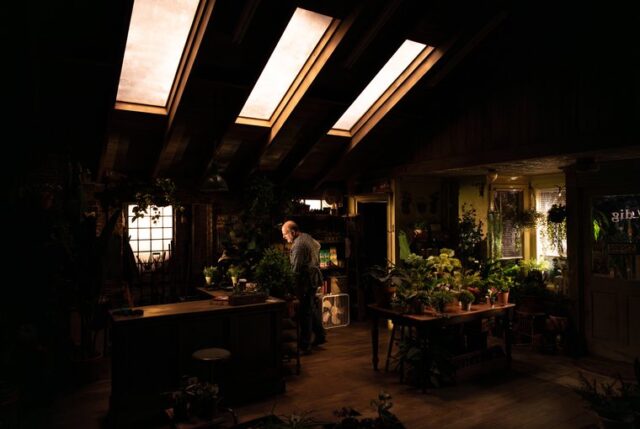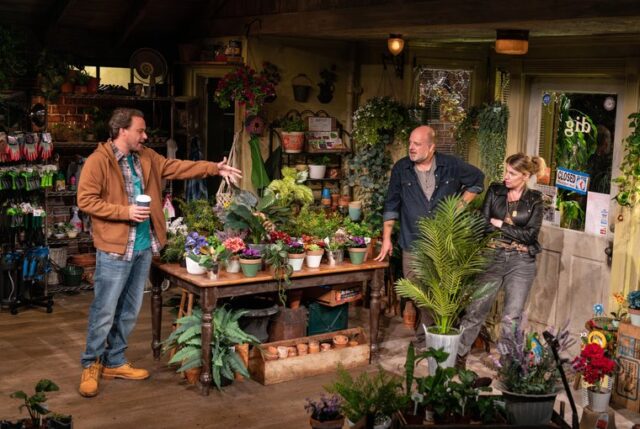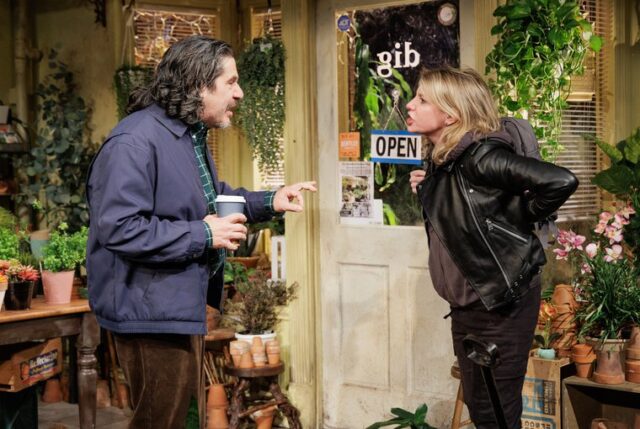
Roger (Jeffrey Bean) sees his easygoing life uprooted in Dig (photo by Justin Swader)
DIG
Primary Stages, 59E59 Theaters
59 East 59th St, between Park & Madison Aves.
Wednesday – Sunday through November 5, $65.50-$85.50
212-279-4200
www.59e59.org
Theresa Rebeck fertilizes the soil with a nearly endless stream of plant-based metaphors in her emotional, hard-hitting Dig, which is blossoming at 59E59 through November 5. Rebeck fills the dialogue with continual references to growth and growing, water, soil, roots, and pots, as characters dig deep to take stock of their lives. It’s not a question of nature vs. nurture so much as an exploration of the nurturing of nature, both foliage and family.
Inspired by a plant business co-owned by her husband, Rebeck’s play is set in a local plant store run by Roger (Jeffrey Bean), a persnickety man in his mid-fifties who is not in the habit of being agreeable with anyone, including customers and personal acquaintances. Roger lives alone in an apartment upstairs, caring more about plants than people. At the start, he is furious that his close friend Lou (Triney Sandoval) has nearly killed a plant he gave him. Roger had given him clear instructions on what to do with it, but Lou didn’t follow them.
“Okay, there was a period where watering was not my central focus,” Lou admits. “‘Focus,’” Roger repeats with scorn. “Focus is the wrong word,” Lou answers. “Focus is no word, it doesn’t apply at all; there is no indication that focus had anything to do with the care of this plant,” Roger argues.
In the corner by the front door, a woman listens to the two men quarreling. “I brought it to you for help. I understand this is not ideal. I did not neglect this plant,” Lou asserts. “I don’t want, I don’t — never mind. It’s fine. I will save this plant,” Roger declares.
We soon learn that the woman in the corner is Megan (Andrea Syglowski), Lou’s thirty-four-year-old daughter who has returned to town after an attempted suicide, a nationally publicized crime, and ensuing imprisonment. Lou and Roger are not so much squabbling over a plant as they are about Megan; Lou is unable to accept the idea that his child-raising could have anything to do with her situation.

Everett (Greg Keller) shares his thoughts on certain types of plants with Roger (Jeffrey Bean) and Megan (Andrea Syglowski) in Dig (photo by James Leynse)
Megan asks for a job from Roger, who is hesitant at first — he prefers things exactly as he has them, viewing change as some kind of enemy — but when Megan insists she doesn’t need to get paid, that she’s just looking for something to do to get her out of her rut, Roger essentially has no choice. The first lesson Roger teaches Megan is repotting, moving a plant to a bigger pot because it has outgrown its space. “It’s too healthy; it just kept growing. It’s something that happens to plants. The roots eat up everything around them. They take in the light and the soil and the air and the leaves, through photosynthesis,” Roger explains, calling photosynthesis “the most important chemical reaction on the face of the planet earth.” Once again, Roger opts for science over relationships with humans.
Meanwhile, Roger’s current assistant, Everett (Greg Keller), is a pot-smoking, video-game-playing dude who drives the delivery truck. Everett wants more responsibilities, but Lou, who does Roger’s books, thinks Everett should be fired.
“I love plants. And I love the truck, I love driving that truck,” Everett pleads with Roger. “You’re driving that truck stoned!” Roger proclaims. “Oh, now listen. The truck — that truck is a holy thing to me,” Everett argues, adding, “I’m good at selling plants, at talking to people about plants.” Roger responds, “You’re good at smoking plants,” to which Everett shoots back, “I don’t apologize for that. The organic world makes sense to me.”
Holiness also comes to the fore through Molly (Mary Bacon), a churchgoing woman looking for bulbs who gets into a tiff with Megan when she recognizes her. Molly returns later to offer forgiveness to Megan and invite her to join their prayer group. Although not religious, Megan checks out the group and finds some comfort there, which doesn’t make her father happy. Each character — including a late-arriving surprise figure (David Mason) — faces their own battle of being “pot bound,” in need of their own form of photosynthesis as they seek happiness in a world in need of cultivation.

Lou (Triney Sandoval) and Megan (Andrea Syglowski) have a tense father-daughter relationship in Dig (photo by James Leynse)
Over her thirty-year career as a playwright, the Ohio-born Rebeck has tended quite a garden; in the past dozen years alone, she has had five plays on Broadway (Dead Accounts with Katie Holmes, Bernhardt/Hamlet with Janet McTeer, Seminar with Alan Rickman, Mauritius with F. Murray Abraham and Bobby Cannavale, and the new I Need That with Danny DeVito) along with several gems off Broadway (Seared with Raúl Esparza, Downstairs with Tim and Tyne Daly). Dig, the New York City debut of which was delayed by the pandemic, is a splendid addition to her hothouse, a tense exploration of rebirth that Rebeck has admirably directed herself.
Christopher and Justin Swader’s cramped set teems with life, primarily green plants with occasional bursts of color. Fabian Fidel Aguilar’s costumes, Mary Ellen Stebbins’s sharp lighting, and Fitz Patton’s incidental music and sound design contribute to the overall realistic feel of the drama. The cast is exceptional, led by a revelatory performance by Syglowski (Halfway Bitches Go Straight to Heaven, queens), who is a whirling dervish of rollercoaster emotions. Sandoval (The Thin Place, 72 Miles to Go . . .), Bacon (Harrison, TX; Women without Men), Bean (About Alice, The Thanksgiving Play), Keller (Shhhh, The Thanksgiving Play), and Mason (Seared, Trick or Treat) provide expert supportive landscaping as the roots of the shop start spreading at a potentially uncontrollable rate.
They all combine to avoid neglect, focusing on properly watering this germinating story of tragedy, responsibility, hope, and redemption.
[Mark Rifkin is a Brooklyn-born, Manhattan-based writer and editor; you can follow him on Substack here.]